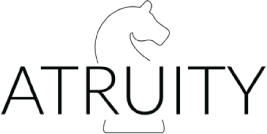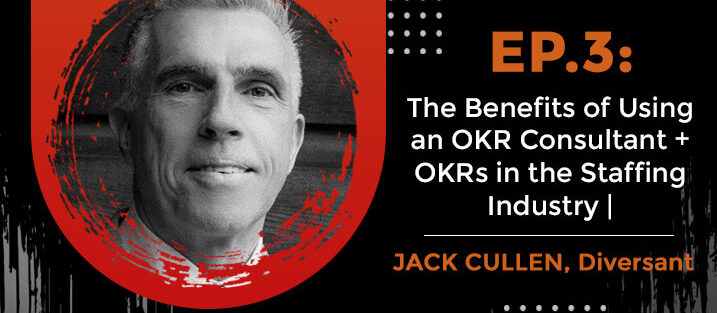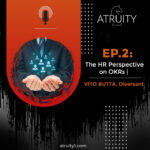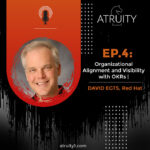In this episode of the OKRs Q&A Podcast, Tim Meinhardt interviews Jack Cullen, a Senior Advisor and Board Member of Diversant. In his current role, Jack is responsible for all sales activities within Diversant – a large IT Staffing company located in New Jersey. Jack is a recognized thought leader in the IT Staffing industry and has over 35 years of experience. He provides incredible insight into not only the IT Staffing industry, but on how to lead and grow organizations as well.
Tim Meinhardt:
Welcome to another exciting episode of the OKRs Q&A podcast, also known as the OKR Corral where OKR Insight is King. I’m your host, Tim Meinhardt. CEO of Atruity, an OKR consultancy, headquartered in our nation’s capital. Today, I am so thrilled to have an opportunity to talk with Jack Cullen. Having known Jack both personally and professionally for almost 40 years, Jack is a very recognized, senior level executive in the world of staffing. As the former president of Modus and now a board member and sales leader at Diversant. Jack has seen the staffing industry evolve from its humble beginnings to today’s sophisticated growth industry. Plus he can still shoot the three. Everyone, it is my sincere pleasure to welcome Jack Cullen.
Tim Meinhardt:
In today’s program, we’re so happy to have Jack Cullen visiting with us today. Jack, share with me a little bit about your job title, company that you’re working with, and some of your biggest accomplishments.
Jack Cullen:
Tim, I’ve been in the IT staffing industry now, it’s hard to believe, but July 15th, 1985 is when I stepped foot into this crazy industry. How about that, 35 years?
Tim Meinhardt:
35 years.
Jack Cullen:
It’s been a great 35 years. I have been very fortunate to have found an industry that I’ve really enjoyed. It’s been a very competitive place, always enjoyed competition. I’ve been very fortunate to be around a lot of great people. Currently I’m working with a company called Diversant, which is a diversity owned IT business, headquarter in Red Bank, New Jersey. They’ll do about $200 million in revenue this year, 14 offices throughout the country. Really great company. I’ve been a board member of the company now for about two and a half years and I’m also a senior advisor to the company. One of the things I’ve been working with them and doing is really trying to run their offense, really trying to find how to correctly run revenue and recruiting streams for the company, rebalance a lot of how the company was built, so we can really grow towards a future. It’s been a great experience and I’m very fortunate to work with a number of wonderful people, both on the executive leadership team and all throughout the company.
Tim Meinhardt:
Fantastic, Jack. You and I, we had these discussions prior to Diversant making an investment in the OKR methodology and putting OKR into the management and operation of your organization. Tell me a little bit about what your initial impressions were of OKRs?
Jack Cullen:
Tim, I think it’s important to realize how did we even get into OKRs? A fellow board member, a gentlemen named Boris Groysberg, and Boris is a Harvard business school professor. Renowned. Wonderful person. I’ve been very fortunate to attend a number of Boris’ teaching seminars, matter of fact, Boris puts on his seminar once a year for Diversant clients, as well as the Diversant staff members. We were doing a case study on a company headquartered actually in Bethesda, Maryland, called Dothead Corporation, I was really intrigued by how well this company was run, how well they performed year in, year out. One of the ingredients and one of the key successes to their formula was they’ve embraced a goal oriented methodology to run their business. Very intriguing.
Jack Cullen:
Why are companies successful? Companies are successful, because they set goals, but many companies lose track of their goals. You set them and then you go on to do all these other things that you’ve got to do throughout the course of your day, week, month, quarter. It’s easy to lose track. What I learned about OKRs and it started with meeting, having a random chat with you in a locker room of Manor Country Club, about what you’re doing to bring and hearing OKRs. I had worked with, in my previous employment, where I spent a lot of years, we had introduced OGSM and OGSM’s a great methodology. It is something that I think can work well in certain situations, certain industries, and certain companies, but in the staffing business, you need something that’s simple, something that’s really going to be embraced and followed.
Jack Cullen:
The more I learned about OKRs and seeing the video that John Doerr had put together and then picking up the book Measure What Matters. Once I started looking at this, I said, wow, I think this is something that could really make a difference for Diversant. So that’s how it all really got started. What it’s led to is I believe tremendous success, particularly in some really difficult times. It’s been something that has been fully embraced. The ownership of the company, right down to every employee throughout the company, is now embracing OKRs and it’s having a dramatic, positive impact on the results of the company.
Tim Meinhardt:
Wow – fantastic Jack. This is a great question. Prompts your head a little bit. Talk to me about what you think were the biggest or the biggest challenge that you guys had in getting started with OKRs?
Jack Cullen:
Tim, like many things, in a lot of companies, there’s always a flavor of the month. Everybody’s looking for the silver bullet, the new, better mousetrap that’s going to lead to great results. Again, been doing this 35 years. Haven’t found really one, I don’t think I’m going to between now and the time I retire. It is really, let’s find something, let’s take a look at something and let’s see if there’s something out there that we can all collectively really buy in. I think the key to Diversant’s success with OKRs is, and I think really the success with OKRs in and of itself, is that it’s very easy to understand. We all should have Objectives.
Jack Cullen:
We have Objectives, we have goals and the Key Results are what we want. To get to those Objectives, to get to those goals, we have to hit certain Key Results. Again, things that are simple I think really work. They really resonated well with me and with the leadership of this company. Let’s not try to overcomplicate things. Let’s talk about things that are really important to this company. Let’s put them out there. Let’s whiteboard this. Let’s have a discussion about this. Let’s really focus on a couple, simple things that are really critical to things that we want to accomplish. Then let’s talk about the Key Results we need to have to have them. Can we measure them? Are we doing this today? The answer is not really. We think we are, we’re sort of, again, I think the beauty of what OKRs have done for us is they’ve put it out there.
Jack Cullen:
We’ve all unanimously agreed. We’ve all bought in. This is not something that is Jack driving. This is something that, John, Bill, the leadership of the company is saying this is important to us. Here’s our mission statement. Here are our key Objectives for the company. Now let’s cascade them down throughout the organization and you keep It real simple. You pick three to five things that you really want to look at and that you want to measure. You want to grade yourself on it. You want to self-grade your score on how you’re doing against this. We talk about it every two weeks. The beauty of it is again, certain things, when they take a real long time to accomplish and it’s easy to get off schedule. Everybody’s really busy.
Jack Cullen:
Here, we’re asking for three minutes of every single person who was involved in an OKR, talk about their OKRs, talk about their results, talk about how they’re doing against them. Again, three minutes, a three minute exercise for each person and voila. It keeps everybody attentive. It keeps everybody focused. What I’ve really found to be so enjoyable about this process is that it’s not tedious. I’m not beating people or really pushing people to do things they don’t want to do. They’ve embraced this because they see the value in it. They’ve seen the results and they’re enjoying it. They’re challenged by it. To me, that’s a great win.
Tim Meinhardt:
That’s terrific. You and I have also talked about how it has made your job just a little bit easier as well.
Jack Cullen:
Tremendously easier. I know it’s important to Jack. I know it’s important to the company. Knowing that these are things that inside each of the individuals is also important to them. We’re all on the same page. We’re all talking the same language. We’re having easy conversations and we’re all on the same conversation. Again, do you want to do better? Do you want to have better performance? Are goals important to you? Have you ever set goals and really lost track of them? When you hear it all of the yeah, yeah, yeahs and you can sit down and offer them a really simple solution to it, it gets embraced.
Tim Meinhardt:
Its powerful. Jack, we have all that visibility, so everybody gets a chance to see what everybody’s doing. Conversation’s changed.
Jack Cullen:
Tim, I think that’s, again, something else that’s really beautiful is that there’s nothing hidden here. It’s all out there. It’s all on our shared drive. Everybody’s looking at it at any point in time. Any point in time, you can add to it, you can score yourself. You can talk about it. I could see anybody and everybody’s, they can see mine. Again, I find some uniqueness to this, because so often organizations say, hey, we do this, we’re all bought in – but are they really? Here, I feel the comfort that everybody really is bought in and they’re all enjoying it. They’re all enjoying what each of them are individually accomplishing, because they’re seeing how this all adds up to how the company is accomplishing its goals.
Tim Meinhardt:
A hundred percent Jack. As having a chance to sit in the meetings, working with everybody, helping them develop their Objectives and Key Results for the quarter, you really find Diversant’s very positive attitude. We’re going to make this work, we’re going to stretch them a little bit. Let’s see if we can shoot for Mars and hit the moon kind of mentality, if we can’t even hit Mars. We’ve kind of answered my next question, but what is the biggest success that OKRs have brought to your organization?
Jack Cullen:
Tim, I’d be hard pressed to find one thing, but I want to start with an intangible. I think the culture, I think it really has helped enforce and drive the competitive, quality culture that we’ve been building inside the organization. It’s led to, and why I said it’s not just one thing, this has been a really big part of the culture of success at people in the company you’re looking for. So I think it’s really helped catalog that, it’s help frame that for us, but it’s lead to the success because here we are in the month of June and a really, really difficult, challenging time and the company’s having tremendous, tremendous results.
Jack Cullen:
I don’t think there’s ever any one thing that leads to something, but I don’t think if we didn’t have OKRs embedded in our business and, and we made the hard right. The hard, right decision to keep with an OKR program, to keep with our investment in this, to keep continuing with this, knowing that we’re in some tough times. Where we don’t know what the industry is going to be, we don’t know what the business environment’s going to be like, but we chose to continue to embrace what we’re doing with OKRs and now we look back and I look at the results that we’ve achieved by having them in place. I guess I am a believer a little bit and a lot, even though I think good luck is a part of what you have, what you’re here to do and how you’re prepared to achieve it. I think it’s a lot of things that helpful out there, but I do really feel that adopting this methodology and putting this inside the company has been tremendously helpful to the success we’ve achieved.
Tim Meinhardt:
Luck is where hard work and opportunity intersect. You all have done a fantastic job. What advice would you give an organization, looking back, you and I had talked a little bit about the staffing industry overall, but what advice would you give any organization that is considering some type of whether it’s goal setting, performance management type of system, and specifically, OKRs?
Jack Cullen:
I hate to say this, but there’s a term out there called no brainer. I think this is no brainer. My first introduction to OKRs, was the link that you sent me, with John Doerr talking about it. When they talk about the success of companies called Google and how Google, in its early stage, chose to embrace OKRs and have continued to live with OKRs. To me, Google’s done pretty well. It’s a pretty good company to look at their recipe for success and say, I’d like to take a little piece out of that, but it’s not only Google. There’s numerous great companies that have adopted OKRs, embraced them, you know Red Hat, many others that are out there, small, large, medium, all different shapes and it’s not something that you have to be really big for, really big to utilize or really small.
Jack Cullen:
If you’re looking for something to help guide you, to help lead you, I think this is the way to go. It’s again, it’s made my life simple. I like trying to find things that make my life simple.
Tim Meinhardt:
Me too.
Jack Cullen:
I like to find things that make me happy and lead to success throughout the organization and for the people in the organization. I’ll tell you, this has been in it. I just think any company that is trying to improve or try to figure out where they’re going, you should look at this. Maybe it’s not for everybody, but I do think that, again, I’ve looked at a lot of different ways of trying to get from point A to point Z and try to find a methodology that really works, keeps it simple, keeps everybody on track, keeps everybody focused, and keeps everybody choosing to be engaged. I think OKRs was a really, really good answer to that.
Tim Meinhardt:
Jack-
Jack Cullen:
I’m going to throw something at you, though. I’m want to throw something at you, though and the Atruity team, this is shameless blood that you didn’t ask me to do, but I don’t think we would have accomplished or have been able to do what we’ve done without you and your team.
Tim Meinhardt:
Thank you.
Jack Cullen:
And the quality of the company. You as our lead consultant on this, how Atruity has built out the game plan for this. That’s been a tremendous success, and again, I think it’s easy to think, hey, look, I can just read the book and we can just go implement it ourselves. We’ve got an HR department, we’ve got plenty of people that we can throw this in the lap of making work. It will never work that way. You got to have a good trusted partner company. Again, what you guys have been able to do, your ability to work with us hand-in-hand, has had a huge, profound impact on our ability to do this. That’s back at you, buddy.
Tim Meinhardt:
Thank you my friend. Thank you so much. Last question. What was the one burning question that you had about OKRs, that you found the answer to?
Jack Cullen:
First burning question was, gang, are we really all in on this? Are we really committed to doing this? It looks good, it’s going to sound great that, hey, we’ve embraced OKRs and we brought this in, but is this going to be another flavor of the month? Is this going to be something we’re going to do and six months later, we’re going to forget what the acronym was? Are we really committed to this? Do we think this is really going to work? Read the book, look at the video, read Radical Focus, and then come back and tell me that this is going to make sense to us. Again, you can’t force buy in. You got to get people to choose to have buy in. What I felt really good about was the buy in was sincere, the willingness to try it and adapt. Again, most people have been down some path of something like this before, whether it’s in their present company or somewhere they came from.
Jack Cullen:
They have never really worked or there was no stickiness to it. It never really lasted, it didn’t have any kind of impact. People have a negative mindset when you introduce something conceptual like this. I love the fact that people are willing to embrace it. I’m even happier today, as we sit here, months, months into this program, seeing how well received it’s been, seeing how fired up people are about, it’s really fun looking back at what we accomplished in Q2. Again, another great thing is a perfect score. Some people want that perfect score, others want to put a real stretch goal out there and they’re not afraid of a score less than perfect and that’s all okay, but it’s all really helping drive the right behaviors and the company and it’s leading to the right results. I really wasn’t sure if we were going to own up to the commitment that we wanted, that I was hoping people would take to this. I’m really pleased at where it is. Knowing that this is something we’re going to continue with for the long run is real exciting.
Tim Meinhardt:
Jack, thank you. This is an excellent discussion, as I knew it would be. I want to thank you so much for participating in the Atruity podcast, Jack. We look forward to seeing wonderful results with Diversant, as you guys continue to move forward. Again, I’d like to thank you for spending time with me today.
Jack Cullen:
Tim. My pleasure. Thank you very much, buddy.
Tim Meinhardt:
You got it.
Jack Cullen:
Thank you, really enjoyed it.
Tim Meinhardt:
Thanks Jack, see you now. Bye bye.
Jack Cullen:
You got it.
Let Atruity provide you with the guidance, insight, support, and framework for a successful OKR implementation. Never miss out on an opportunity for success. Give our office call today at 240.403.4086 and get our advice on starting OKR. Let us discuss the right OKR program that meets your organization’s implementation preferences.
To listen to the podcast, click on the links below:












